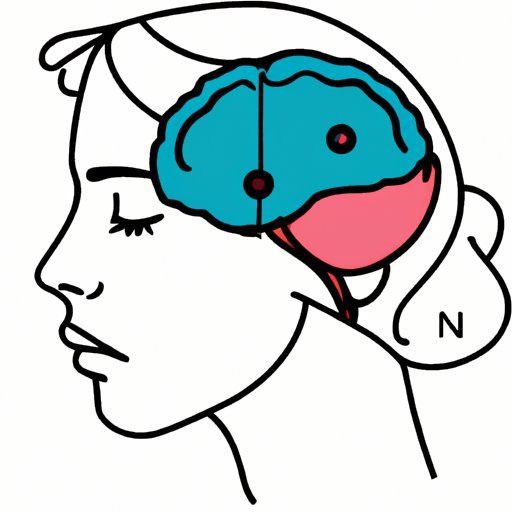
Introduction
We all know how frustrating it can be to get a poor night’s sleep, especially over an extended period. Most of us have been there, staring at the ceiling, counting sheep, and struggling to drift off into a peaceful slumber. Unfortunately, not getting enough sleep affects more than just your energy levels and mood the following day – it can have a profound impact on your mental health.
In this article, we explore the surprising link between sleep and mental health, discuss the negative consequences of sleep deprivation on mental health, and provide tips for improving your sleep habits to prevent these effects and maintain optimal mental health.
The Surprising Connection Between Sleep and Mental Health: Understanding the Link
Many of us don’t realize just how vital sleep is to our mental and physical health. Sleep plays a crucial role in regulating mood, emotions, and cognitive functioning. When we’re not getting enough quality sleep, our mental health can suffer.
Studies have shown that sleep deprivation is a significant risk factor for developing several mental health disorders, including anxiety, depression, and bipolar mood disorder. Additionally, sleep disorders such as insomnia and obstructive sleep apnea can also negatively impact mental health and overall well-being.
The Harmful Effects of Sleep Deprivation on Your Mental Health
Chronic sleep deprivation can have negative consequences on mental health, leading to a range of issues such as mood disorders and cognitive impairments. When we don’t get enough sleep, our brains are not functioning optimally, resulting in difficulty with decision-making, memory, and concentration.
Research has also found that people who report high levels of insomnia symptoms are at greater risk of developing depression and anxiety disorders. This is because a lack of sleep can cause chemical imbalances in the brain, leading to mood swings, irritability, and feeling overwhelmed.
Unlocking the Science Behind How Lack of Sleep Impacts Your Mental Health
Neuroscience research has made advancements in understanding the connection between sleep and mental health. Chemical messengers called neurotransmitters act as a vital link between sleep and mental health. These neurotransmitters regulate mood, emotions, and cognitive processes.
Disturbances in sleep can cause imbalances in these neurotransmitters, leading to issues like depression and anxiety. For example, the neurotransmitter serotonin is responsible for regulating mood. Lack of sleep causes a decrease in serotonin levels, leading to higher levels of anxiety and depression.
The Importance of Sleep for Maintaining Optimal Mental Health
Getting enough quality sleep is crucial for maintaining optimal mental health and well-being. Good quality sleep not only helps regulate mood but also supports the immune system, improves cognitive functioning, and helps maintain healthy interpersonal relationships.
Improving your sleep habits can help you achieve better mental health and overall well-being. Strategies for improving sleep quality include things like establishing a bedtime routine, keeping the bedroom dark and cool, refraining from electronics before bedtime, and ensuring physical activity during the day.
Breaking Down the Psychological Consequences of Sleep Deprivation and Mental Health
Sleep deprivation can cause a host of psychological consequences that impact both your mental and physical health. Lack of sleep can lead to cognitive distortions, which influence the way we see ourselves and the world around us, resulting in negative self-talk and heightened feelings of stress.
The good news is that there are strategies you can implement to manage the psychological effects of sleep deprivation. Practicing mindfulness and meditation, engaging in physical activity, and creating a positive sleep environment are all effective ways to improve your mental health and well-being.
Conclusion
Getting enough sleep is crucial for maintaining optimal mental health and well-being. Chronic sleep deprivation can significantly impact mental health, leading to issues like depression and anxiety. The good news is that by improving your sleep habits, you can improve your overall well-being and maintain good mental health for years to come.
Choose strategies that work for you, such as establishing a bedtime routine, investing in comfortable bedding, and practicing relaxation techniques before bed. Your body and mind will thank you.





